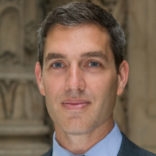The story of the akedah (the sacrifice, referring to Abraham and Isaac) reminds me of a Yiddish aphorism to the effect that “an act of folly which turns out well is still an act of folly.”
Abraham, our heroic knight of faith, heeds God’s command to slaughter his son Isaac, an act that is fortuitously prevented by angelic intervention at the critical moment. Indeed, while Abraham passes the divine test and Isaac emerges unscathed, I cannot help but wonder if the mission’s success has horrific and irreparable consequences: that while it turned out “well,” it must ultimately be judged as “folly.”
Suggestions of such a reading are found by comparing the beginning and the end of the story. God’s initial command to Abraham famously identifies Isaac by three markers: “Your son, your favored son … whom you love” (Genesis 22:2). Some verses later, having stayed Abraham’s hand, the angel assures our patriarch, “For now I know that you fear God, since you have not withheld your son, your favored one, from Me” (Gen 22:12, 22:16). The lack of mention of the third dimension of Abraham’s relationship with Isaac — love — is altogether striking.
Where is the love?
Somewhere on Mount Moriah filial love was sacrificed. Having carried out God’s command, Abraham could no longer claim the affections that had preceded the akedah. This reading is supported by the lack of further contact between father and son as they descended the mountain and, for that matter, the rest of their lives.
Given such an interpretation, we are left with a troubling question: If Abraham’s obedience came at such a high cost, why exactly do we read this story on Rosh HaShanah?
One possible answer is to understand the function the akedah plays within the High Holy Day machzor. In the zichronot (remembrances) section of the musaf service, we ask God to remember Abraham’s willingness to sublimate his compassion for Isaac in order to carry out God’s command:
“Remember how he bound his son Isaac on the altar, subduing his fatherly compassion so that he might do Your will with a perfect heart. So may Your compassion overbear Your anger against us…”
The logic of the prayer is unexpected. It asks God to look at Abraham’s actions as a negative model for divine response. Contrary to conventional Jewish interpretation, the machzor reads the akedah as an example of what not to do. Abraham’s choice to suppress compassion and to sacrifice love, while affirmed within the Bible (and much of rabbinic literature), serves as a counter-text for us on the High Holy Days.
After all, as flawed human beings, we are painfully aware that if God were to apply strict standards of justice, the divine ruling should not tilt to our favor.
Knowing this, we ask that God consider us kerachem av al banim, as a parent would a child. Such a bond considers the entirety of a relationship over any particular failing, seeks compassion over justice, and chooses love over the letter of the law. It is this demeanor that we seek from God over the Days of Awe.
So too, between us and those for whom we care most. How often have we let a love be sacrificed, eclipsed by demands of a moment? The hardest part of the High Holy Days is not asking for forgiveness, but granting forgiveness. The heroics of this season emerge from the un-Abrahamic ability to let love overwhelm our other instincts. What is the act of reconciliation if not an openness to the possibility that the totality of a relationship exceeds any single shortcoming?
German philosopher Walter Benjamin once wrote: “The only way of knowing a person is to love them without hope.” In responding to God’s terrible command, Abraham chose a path that we must judge as a failed success. The success of our season of repentance will be found in our ability to love both with hope and forgiveness, and pray that God will do the same.
Elliot J. Cosgrove is the rabbi of Park Avenue Synagogue and editor of “Jewish Theology in Our Time: A New Generation Explores the Foundations and Future of Jewish Belief” (Jewish Lights).
The New York Jewish Week brings you the stories behind the headlines, keeping you connected to Jewish life in New York. Help sustain the reporting you trust by donating today.





